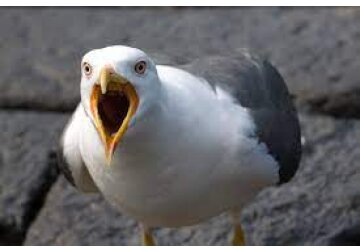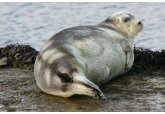
Noisy nuisance or natural wonder? Why there's no easy answer to seagulls
Aggressive behaviour by seagulls is commonplace in towns and cities around the UK - especially those close to the sea. It has led to calls by some for the birds to be culled, but experts are warning they actually need greater protection.
It's a scene familiar in seaside towns across much of the UK.
A middle-aged man is trying to enjoy his lunchtime fish and chips on the Hastings seafront when a colony of half a dozen herring gulls - better known as seagulls - sidle up to him, trying to steal a bite.
"Go away," he shouts, shooing them away.
"They're a nuisance aren't they?" he says as he flaps his arms at them, the leader of the pack bouncing cockily out of his reach.
A few miles west along the shore, Sarah and Terry are enjoying an afternoon stroll, watching a pair of gulls frolicking on the stone beach.
"They can be pretty intimidating - especially when you're trying to eat - but they're also amazing to watch," Sarah tells the BBC.
"Although they're scary, they're also quite majestic, so I'm pretty conflicted," she says.
Terry, a self-confessed nature lover, describes them as a "wonderful species", one "we're lucky to have".
As the BBC found in Hastings, seagulls are not universally popular in the UK. A 2022 YouGov survey found that more than half of those asked had a negative view of them.
Their behaviour - as well as their apparent proliferation in towns - has led to calls by some for a cull of gulls. Another survey, this time in a 2015, suggested more people supported culls than opposed them.
Peter Rock, an urban gull expert, believes the birds are unfairly vilified, partly because they're noisy.
"There have been politicians who say what they want is 'action', that they want to get rid of them - and I often think, good luck with that," he says.
"The bottom line is that we invited them here in the first place," through our actions, Mr Rock explains, describing the birds as "very smart" and "the supreme adaptors".
Gulls are members of a large family of seabirds and have traditionally lived close to water. But in recent decades an increasing number have moved inland, often towards cities where food supplies are more readily available.
As part of this increased urbanisation, many are now living on roofs. These are the "perfect habitat" for gulls, said Mr Rock, as not only are roofs cliff-like - replicating their natural habitat - but they also offer warmth and protection.
Falling numbers
Although some call for action to limit gulls' numbers, experts warn the birds are already in decline. Herring gulls have been on the Red List of Birds of Conservation Concern, the highest conservation priority, since 2009.
The Seabirds Count, a census of the UK and Ireland's main seafowl species, found that herring gulls were one of 11 groups that saw a drop in their population between 2002 and 2021.
The study found that more than 51,000 pairs of herring gulls nesting at natural sites - rather than towns and cities - were lost during the reporting period, accounting for a 41% fall in the population.
The reason for this fall in numbers is complex, and includes a number of factors, such as a change in food sources in their natural environment, says Daisy Burnell, senior marine ornithologist for the Joint Nature Conservation Committee, which conducted the study.
"We also cannot exclude the possibility that some of the population has moved into the urban habitat, where there are more safe nest sites and good food availability," she adds, saying more research is needed.
The study estimated that between 176,000 and 195,000 pairs of herring gulls are breeding in cities.
Because the latest census used a new method for monitoring urban gulls, the study's authors said comparing figures with earlier studies was not possible. However, it estimated that almost three-quarters of the UK and Ireland's breeding herring gull population live in urban areas, mainly along the coast.
"The picture's pretty bleak, to be honest," said Jacques Villemot, from the RSPB. "We do see them in cities and seaside towns, but they are incredibly endangered and their numbers are declining."
So how do we deal with them?
Amid this change in the population, it has become harder to actively reduce the number of gulls.
Like all wild birds in the UK, they are protected under the Wildlife and Countryside Act 1981. Licences to control small numbers of gulls are issued by Natural England, for conservation purposes as well as public safety.
They are only issued where there is clear evidence that there is a significant conflict which cannot be resolved through non-lethal methods, a spokesperson said.
Despite the bird's conservation status, the number of licences granted has grown - Natural England has issued 101 in 2023, up from 93 in 2021 and 85 in 2018.
But councils throughout the UK have also started introducing new approaches to tackle the issue, albeit usually with limited success.
This has included replacing real gull eggs in nests with plastic equivalents or destroying eggs before they've reached the embryo stage. As well as reducing the number of birds entering the population, it also moderates their behaviour, as gulls tend to become more aggressive when they have young to protect.
Other councils have introduced "walk with a hawk" programmes to scare the birds away, or have resorted to installing spikes, nets or wires to prevent gulls from nesting on rooftops.
The birds view such measures as a "minor inconvenience", said Mr Rock, the urban gull expert.
And Mr Villemot believes that instead of trying to get rid of gulls, people should learn to live alongside them.
"That involves being wary about food waste, not feeding them, being wary of chicks, and being careful with pets - it's about avoiding creating conflict situations with them," he said.
"How often do you get to see [birds] like that up close? It's quite a privilege, and not normally that accessible these days - so I think it's important to appreciate what we are seeing."
Bbc.com







